Saddam Hussein, a former President of Iraq, wrote four novels and a number of poems. The first two books (Zabibah and the King and The Fortified Castle) were "Written by He Who Wrote It", a traditional way in Arabic writing to preserve anonymity. [1]
Zabibah and the King (Arabic : زبيبة والملكZabībah wal-Malik), also transliterated Zabiba and the King, written in 2000, is a novel that the CIA believes was written by Saddam Hussein. [2] The plot is a love story about a powerful ruler of medieval Iraq and a beautiful commoner girl named Zabibah. Zabibah's husband is a cruel and unloving man who rapes her. The book is set in 7th- or 8th-century Tikrit, Hussein's home town. [3] The book is intended to be seen as an allegory, with Zabibah representing the people of Iraq, her husband representing the United States, and the ruler representing Saddam Hussein himself. [4] The book was believed to be the subject of the 2012 movie The Dictator . However, this turned out not to be true. [5]
The Fortified Castle (Arabic : القلعة الحصينةal-Qala'ah al-Haṣīnah) is a 713-page novel published in 2001. [6] It is another allegorical work. It concerns the delayed wedding of the Iraqi hero, who fought in the war against Iran, to a Kurdish girl.
There are three characters: the two brothers Sabah and Mahmud, from a rural area on the west bank of the Tigris River who come from a farming family, and a young woman, Shatrin, from Suleimaniya. They all go to the same university in Baghdad.
Sabah is a war hero from the days of the Battle of New Qadisiyya (Iran–Iraq War), during which he was wounded in the leg and taken prisoner of war in Iran, from which he finally manages to escape with a few friends.
The power of the "fortified castle" (a reference to Iraq) lies in its unity; despite proposals to divide the property, the hero's mother refuses. She also states that it cannot be purchased with money: "Only those who give it their blood and defend it are its rightful owners." [7]
Men and the City (Arabic : رجال والمدينةRijāl wal-Madīnah) concerns the rise of the Ba'ath Party in Tikrit.
Begone, Demons, also translated as Get Out, You Damned or Get Out of Here, Curse You! (Arabic : اخرج منها يا ملعونUḵruj Minhā yā Mal'ūn), is Saddam Hussein's fourth and last novel, allegedly finished the day before U.S. forces invaded. [8] The novel describes, through biblical metaphor, a Zionist-Christian conspiracy against Arabs and Muslims. An Arab army eventually thwarts the conspiracy by invading their enemy's land and destroying two massive towers, as a reference to the September 11 attacks. [9] The characters include the narrator, Abraham, named for the patriarch in Jewish, Christian and Muslim traditions, and his grandchildren, three cousins named Ezekiel, Youssef and Mahmoud, who represent Jews, Christians and Muslims respectively.
The book was published in Tokyo by a Japanese publisher, Tokuma Shoten Publishing, in 2006 under the title Devil's Dance. A total of eight thousand copies were printed of the 256-page novel.
It was translated into Turkish by Humam Khalil Abu-Mulal al-Balawi. [10]
Raghad Hussein had tried to publish the novel in Jordan, and planned to print 100 thousand copies, until the government prevented the publication. [11]
In 2007 the novel was translated into Russian and published in Saint Petersburg by the Amfora Publishing House. 5,000 copies of 206 pages were printed. The chief editor of the publishing house Vadim Nazarov said that the novel's publication was "an ideological initiative" and "a response to pain". He explained that "when Serbian houses were being bombed, we published Serbian novels. Now we publish Saddam Hussein's book. When he was the leader of Iraq, there was more discipline in this country". [12]
It has not been translated or sold in any other languages.

Saddam Hussein Abd al-Majid al-Tikriti was an Iraqi politician and revolutionary who served as the fifth president of Iraq from 1979 to 2003. He also served as prime minister of Iraq from 1979 to 1991 and later from 1994 to 2003. He was a leading member of the revolutionary Arab Socialist Ba'ath Party and later the Baghdad-based Ba'ath Party and its regional organization, the Iraqi Ba'ath Party, which espoused Ba'athism, a mix of Arab nationalism and Arab socialism.
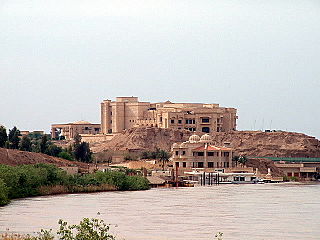
Tikrit is a city in Iraq, located 140 kilometers (87 mi) northwest of Baghdad and 220 kilometers (140 mi) southeast of Mosul on the Tigris River. It is the administrative center of the Saladin Governorate. As of 2012, it had a population of approximately 160,000.
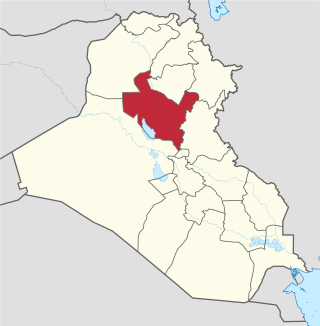
The Saladin, Salah ad Din or Salah Al-Din Governorate is one of Iraq's 19 governorates, north of Baghdad. It has an area of 24,363 square kilometres (9,407 sq mi), with an estimated population of 1,042,200 people in 2003. It is made up of 8 districts, with the capital being Tikrit. Before 1976 the governorate was part of Baghdad Governorate.

Izzat Ibrahim al-Douri was an Iraqi politician and army field marshal. He served as Vice Chairman of the Iraqi Revolutionary Command Council until the 2003 U.S. invasion of Iraq and was regarded as the closest advisor and deputy under President Saddam Hussein. He led the Iraqi insurgent group Naqshbandi Army.
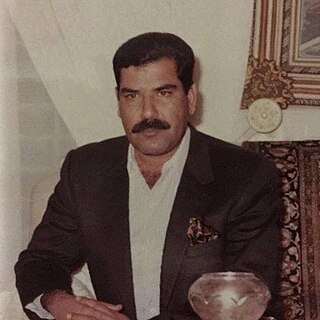
Watban Ibrahim al-Nasiri was an Iraqi politician and former Interior Minister of Iraq. He was the half-brother of Saddam Hussein and the brother of Barzan al-Tikriti. He was taken into coalition custody 13 April 2003, following his capture as he tried fleeing to Syria. He died in prison of natural causes in 2015.
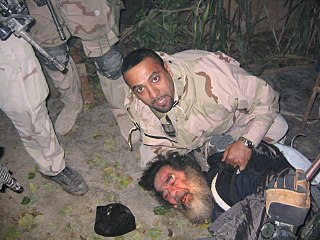
Saddam Hussein, the deposed president of Iraq, was captured by the United States military in the town of Ad-Dawr, Iraq on 13 December 2003. Codenamed Operation Red Dawn, this military operation was named after the 1984 American film Red Dawn.
Laurie Mylroie is an American author and analyst who has written extensively on Iraq and the War on Terror. The National Interest first published this work in an article entitled, "The World Trade Center Bombing: Who is Ramzi Yousef? And Why it Matters." In her book Study of Revenge (2000), Mylroie laid out her argument that the Iraqi regime under Saddam Hussein had sponsored the 1993 World Trade Center bombing and subsequent terrorist attacks. She claimed those attacks were part of an ongoing war that Saddam waged against America following the cease-fire to the 1991 Gulf War. Less than a year after her book was published, the September 11 attacks occurred. Mylroie subsequently adopted the view that Saddam had been responsible for the attacks, defending it on many occasions, including before the 9/11 Commission.

Naji Sabri Ahmad Al-Hadithi is an Iraqi former politician who served as the Iraqi Foreign Minister under Saddam Hussein in the lead-up to the 2003 invasion of Iraq.

Zabibah and the King is a romance novel, originally published anonymously in Iraq in 2000, that was written by Saddam Hussein.
This article is a chronological listing of allegations of meetings between members of al-Qaeda and members of Saddam Hussein's government, as well as other information relevant to conspiracy theories involving Saddam Hussein and al-Qaeda.
The Fortified Castle is Saddam Hussein's third of four novels. The book involves political metaphor. It is 713 pages and was published in 2001. It is another allegorical work. It concerns the delayed wedding of the Iraqi hero, who fought in the war against Iran, to a Kurdish girl.
Men and the City is a 320-page novel by former Iraqi leader Saddam Hussein which was published in 2002. The work was largely autobiographical in nature and describes how Saddam Hussein's grandfather fought the Turks during the Ottoman Empire. It also focuses on the rise of the Ba'ath Party and several of Saddam's relatives including his uncle. It was the third work which Saddam published. The hero of the novel is a character named Saleh but it is widely assumed that the novel is a thinly veiled autobiography of Saddam himself.
Begone, Demons is Saddam Hussein's fourth and last novel. It is a fictional novel, with political metaphor. It is thought to have been written in anticipation of the 2003 Iraq War in 2002 or 2003. It was not yet published before the 2003 invasion of Iraq.
Zabiba is an Arabic word derived from the word zabīb, meaning "raisin". It may refer to:
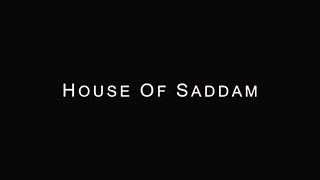
House of Saddam is a 2008 British docudrama television miniseries that charted the rise and fall of Saddam Hussein. A co-production between BBC Television and HBO Films, the series was first broadcast on BBC Two in four parts between 30 July and 20 August 2008.

Clash of Loyalties is a 1983 Iraqi film focusing on the formation of Iraq out of Mesopotamia in the aftermath of the First World War.

The interrogation of Saddam Hussein began shortly after his capture by U.S. forces in December 2003, while the deposed president of Iraq was held at the Camp Cropper detention facility at Baghdad International Airport. Beginning in February 2004, the interrogation program, codenamed Operation Desert Spider, was controlled by Federal Bureau of Investigation (FBI) agents. Standard FBI FD-302 forms filed at the time were declassified and released in 2009 under a U.S. Freedom of Information Act request filed by the National Security Archive. Saddam, identified as "High Value Detainee #1" in the documents, was the subject of 20 "formal interviews" followed by five "casual conversations." Questioning covered the span of Saddam's political career, from 2003 when he was found hiding in a "spider hole" on a farm near his home town of Tikrit, back to his role in a failed 1959 coup attempt in Iraq, after which he had taken refuge in the very same place, one report noted.
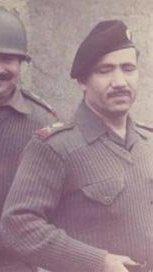
Maher Abd al-Rashid was an Iraqi military officer and member of the Al-Bu Nasir tribe. Rashid rose to prominence during the Iran-Iraq War, and was regarded as one of Saddam's best generals, serving as Chief-of-Staff of the Iraqis after being brought out of retirement, which he had been forced into in 1983. Rashid also played a prominent role in helping Iraq to regain her initiative during the war. Not all assessments of Rashid were so kind, and Ra'ad al-Hamdani refers to him as "one of the dumbest generals in the army".

The First Battle of Tikrit was fought for the Iraqi city of Tikrit following the city's capture by the Islamic State and Ba'athist Loyalists during the 2014 Northern Iraq offensive. The battle took place between 26 and 30 June 2014.
Reactions to the execution of Saddam Hussein were varied. Some strongly supported the execution, particularly those personally affected by Saddam's actions as leader. Some of these victims wished to see him brought to trial for his other actions, alleged to have resulted in a much greater number of deaths than those for which he was convicted. Some believed the execution would boost morale in Iraq, while others feared it would incite further violence. Many in the international community supported Saddam being brought to justice but objected in particular to the use of capital punishment. Saddam's supporters condemned the action as unjust.